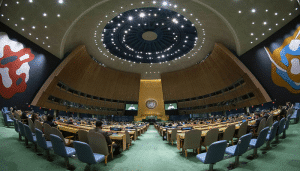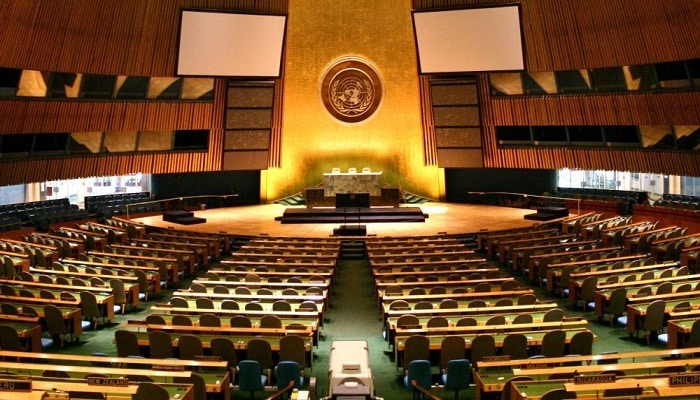Pak Sahafat – On the eve of the United Nations General Assembly meeting, the release of news about absent figures in this meeting shows that how necessary are reforms in the structure of this organization, which is accused of being a system dominated by the West, in a world that has taken the path of multipolarity today?
According to Pak Sahafat News Agency’s report on Sunday, while there are news about the absence of Emmanuel Macron, Vladimir Putin and Xi Jinping, the presidents of the Republic of France, Russia and China in the meeting of the United Nations General Assembly, speculations about the non-attendance of British Prime Minister Rishi Sonak in this meeting have also gained strength.
In a note entitled “Brain death of the United Nations and the urgency of its reform”, Mark Samo, the editor of the economic magazine “Challenges”, called the empty seats of the heads of some countries at the meeting of the United Nations General Assembly as a sign of the crisis that has engulfed this international organization.
It is stated in this article: The United Nations is caught in a crisis that is both a consequence and a sign of the growing distance of countries from each other in the international arena, and is acting badly and very badly. Certainly, its major specialized agencies, which are at the forefront of refugee protection and are active in various aspects of human security, often struggle to carry out their duties with real efficiency.
But the two political bases of this institution, including the General Assembly and the Security Council, have been shaken more than ever since its establishment at the end of World War II. One of its founding countries, Russia, a permanent member of the Security Council and has veto power, is involved in a war with Ukraine and violates all the principles of the UN Charter. This charter was supposed to consider war as “illegal” except in cases of self-defense or by order of the Security Council. Meanwhile, the United Nations is unable to take practical action, and its performance is limited only to the statements of the Secretary General about the global challenges that humanity must face, including global warming.
Macron, Putin and Xi Jinping, the absent leaders
The meeting of the UN General Assembly, which will be held in New York in the coming days, is an example of this deep weakness in the UN system and multilateralism, which has been its preferred framework for a long time.
In his first speech in September 2017 at this annual meeting in front of the representatives of 193 countries, the President of France called for “renewed multilateralism to recreate the United Nations”. He will not attend this meeting this year and will have to stay in France to welcome Charles III of England and then Pope Francis.
But he will not be the only notable absentee of this great world diplomatic meeting, either in the words expressed on the official platform or in the meetings and negotiations behind the scenes. Not surprisingly, Russian President Vladimir Putin and his Chinese counterpart Xi Jinping are also absent, emphasizing the secondary role of the Western-dominated United Nations.
The crisis of multilateralism
During the Cold War, the paralysis of the Security Council due to veto threats by the five permanent members was a reality. But according to General Charles de Gaulle, the former president of France, this “machine” was still working. Historian Sandrine Kott wrote in her book entitled Organizing the World (Sway Publishing; 2020), which is dedicated to the coexistence of the two blocs, East and West, in institutions like the United Nations: As violent as the verbal conflicts in international forums were, it never stopped the development of multilateralism practices, and international organizations seemed to emerge stronger from each new crisis.
Despite their frequent deadlocks in the Security Council or the United Nations General Assembly, these two blocs managed to cooperate with each other and build the foundations of a kind of multilateralism. Now, this is increasingly under threat, with the credibility of the United Nations being questioned by demanding powers and angered by the countries of the so-called “Global South”.

Of course, their bitterness is not without foundation. The United Nations system was founded in 1945 on three pillars: establishing security and peace with the help of the United Nations, organizing the economy with the help of the International Monetary Fund and the World Trade Organization, and the realization of human rights under the supervision of the Human Rights Council. Today, a series of special organizations, including the High Commission for Refugees, have been added to this system. However, instead of establishing equality of states, the UN Charter assigned a special role to the five winners of the conflict – the United States, Great Britain, France, the Soviet Union, and China.
These permanent members of the Security Council have the right of veto. These great powers, whose power is preserved in the structure of the United Nations, can prevent decisions against their interests or those of their supporters whenever they want. So “there are some countries that are a little more equal than others.”
Dust in the United Nations
However, Westerners, contrary to popular belief, are aware of the increasing disconnection of the UN system from the realities of the world. They even talk about fundamental reforms, including the reform of the Security Council, the axis of restrictive powers and the position of privileges of power. The first UN summit in this field was held in 2005, and since then two priorities have been on the table: on the one hand, expanding it to better reflect the world situation, and on the other hand, reforming the veto power, which can the case of genocide or mass crimes against humanity is suspended.

